英语---河北省安平中学2016-2017学年高一上学期期中考试
- 格式:doc
- 大小:52.40 KB
- 文档页数:12
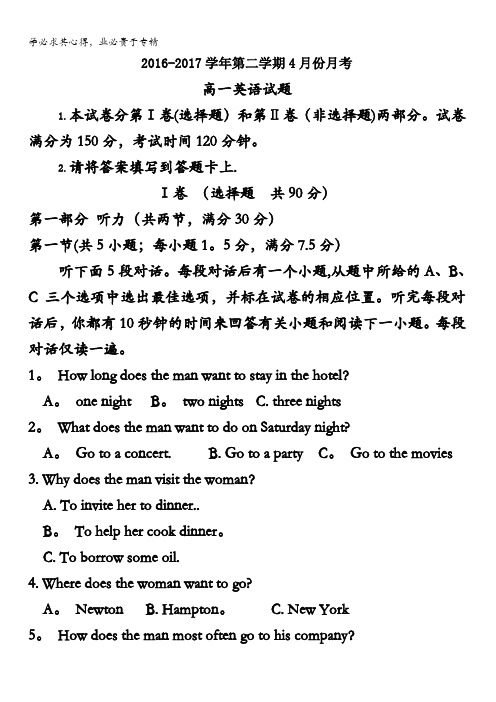
2016-2017学年第二学期4月份月考高一英语试题1.本试卷分第Ⅰ卷(选择题)和第Ⅱ卷(非选择题)两部分。
试卷满分为150分,考试时间120分钟。
2.请将答案填写到答题卡上.Ⅰ卷(选择题共90分)第一部分听力(共两节,满分30分)第一节(共5小题;每小题1。
5分,满分7.5分)听下面5段对话。
每段对话后有一个小题,从题中所给的A、B、C三个选项中选出最佳选项,并标在试卷的相应位置。
听完每段对话后,你都有10秒钟的时间来回答有关小题和阅读下一小题。
每段对话仅读一遍。
1。
How long does the man want to stay in the hotel?A。
one night B。
two nights C. three nights2。
What does the man want to do on Saturday night?A。
Go to a concert. B. Go to a party C。
Go to the movies3. Why does the man visit the woman?A. To invite her to dinner..B。
To help her cook dinner。
C. To borrow some oil.4. Where does the woman want to go?A。
Newton B. Hampton。
C. New York5。
How does the man most often go to his company?A. By bus。
B。
On foot. C. By car第二节(共15小题;每小题1.5分,满分22.5分)听下面5段对话或独白.每段对话或独白后有几个小题,从题中所给的A、B、C三个选项中选出最佳选项,并标在试卷的相应位置。
听每段对话或独白前,你将有时间阅读各个小题,每小题5秒钟;听完后,各小题将给出5秒钟的作答时间。
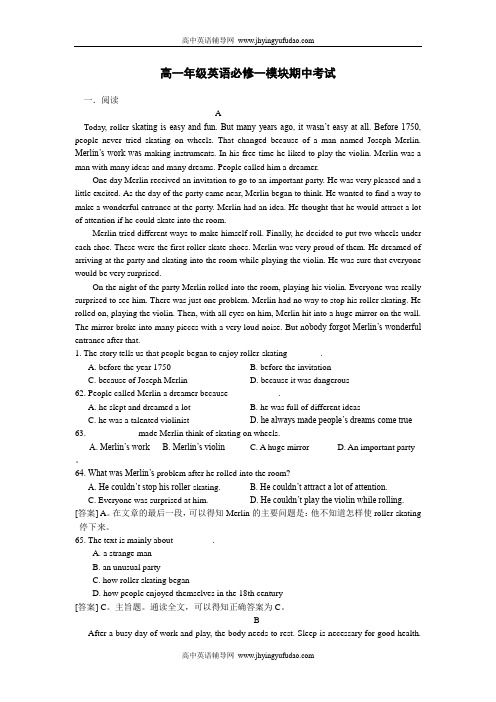
高一年级英语必修一模块期中考试一.阅读AToday, roller skating is easy and fun. But many years ago, it wasn’t easy at all. Before 1750, people never tried skating on wheels. That changed because of a man named Joseph Merlin. Merlin’s work was making instruments. In his free time he liked to play the violin. Merlin was a man with many ideas and many dreams. People called him a dreamer.One day Merlin received an invitation to go to an important party. He was very pleased and a little excited. As the day of the party came near, Merlin began to think. He wanted to find a way to make a wonderful entrance at the party. Merlin had an idea. He thought that he would attract a lot of attention if he could skate into the room.Merlin tried different ways to make himself roll. Finally, he decided to put two wheels under each shoe. These were the first roller skate shoes. Merlin was very proud of them. He dreamed of arriving at the party and skating into the room while playing the violin. He was sure that everyone would be very surprised.On the night of the party Merlin rolled into the room, playing his violin. Everyone was really surprised to see him. There was just one problem. Merlin had no way to stop his roller skating. He rolled on, playing the violin. Then, with all eyes on him, Merlin hit into a huge mirror on the wall. The mirror broke into many pieces with a very loud noise. But n obody forgot Merlin’s wonderful entrance after that.1. The story tells us that people began to enjoy roller-skating _______.A. before the year 1750B. before the invitationC. because of Joseph MerlinD. because it was dangerous62. People called Merlin a dreamer because ___________.A. he slept and dreamed a lotB. he was full of different ideasC. he was a talented violinistD. he always made people’s dreams come true63. ___________ made Merlin think of skating on wheels.A. Merlin’s workB. Merlin’s violinC. A huge mirrorD. An important party 。
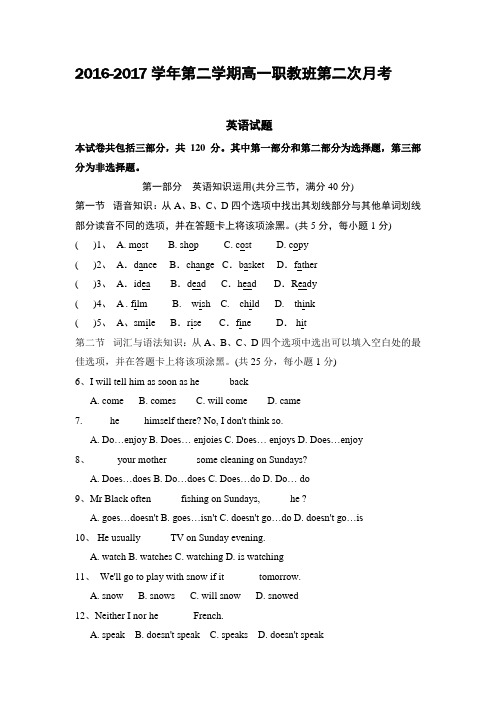
2016-2017学年第二学期高一职教班第二次月考英语试题本试卷共包括三部分,共120分。
其中第一部分和第二部分为选择题,第三部分为非选择题。
第一部分英语知识运用(共分三节,满分40分)第一节语音知识:从A、B、C、D四个选项中找出其划线部分与其他单词划线部分读音不同的选项,并在答题卡上将该项涂黑。
(共5分,每小题1分)( )1、A. most B. shop C. cost D. copy( )2、A.dance B.change C.basket D.father( )3、A.idea B.dead C.head D.Ready( )4、A . film B. wish C. child D. think( )5、A、smile B.rise C.fine D. hit第二节词汇与语法知识:从A、B、C、D四个选项中选出可以填入空白处的最佳选项,并在答题卡上将该项涂黑。
(共25分,每小题1分)6、I will tell him as soon as he _____ backA. comeB. comesC. will comeD. came7._____ he ____ himself there? No, I don't think so.A. Do…enjoyB. Does… enjoiesC. Does… enjoysD. Does…enjoy8、_____ your mother _____ some cleaning on Sundays?A. Does…doesB. Do…doesC. Does…doD. Do… do9、Mr Black often _____ fishing on Sundays, _____ he ?A. goes…doesn'tB. goes…isn'tC. doesn't go…doD. doesn't go…is10、 He usually _____ TV on Sunday evening.A. watchB. watchesC. watchingD. is watching11、We'll go to play with snow if it ______ tomorrow.A. snowB. snowsC. will snowD. snowed12、Neither I nor he ______ French.A. speakB. doesn't speakC. speaksD. doesn't speak13、____ your brother _____ a letter to ? My father.A. Who… wroteB. What…wroteC. Who did…writeD. What did… write14、This time yesterday Jack _____ his bike. He _____ TV.A. repaired… didn't watchB. was repairing… wat chedC. repaired… watchedD. was repairing… wasn't watching15、The boy_____ English on the radio when I _____ his door.A. learned… was openingB. was learning… openedC. learned… openedD. is learning… open16、Look at those clouds. It _____ soon, I'm afraid.A. is going to rainB. is rainingC. will rainD. won't rain17、_____ you ____ me up at six, please ?A. Are…going to wakeB. Are…wakingC. Will…wakeD. Do…wake18、______ lovely weather we are having these days!A. HowB. How anC. WhatD. What an19、________ delicious the soup is! I’d like some more.A. HowB. How anC. WhatD. What an20、 Not until I began to work ____ how much time I had wasted.A. didn't I realizeB. did I realizeC. I didn't realizeD. I realize21、what you said just now ____ me of that American professor.A. mentionedB. informedC. remindedD. Memorized22、He did very well, but_________ the record.A.failed to breakB. fails to breakC.failed into breakingD.fails into breaking23、I don't care __________your car breaks down or not.A.what B . when C.whether D. If24.1. Are we allowed ________ in the river?A. swimB. to swimC. swimmingD. to swimming25.The Smiths _______ in China for 8 years.A. has livedB. livedC. have beenD. live26.--____ you ever ____ to the US?-- Yes, twice.A. Have, goneB. Have, been C, Do, go D. were, going27. It is ten years _____ I last saw her.A. afterB. sinceC. forD. that28.-______ you ___ your homework yet ?-Yes . I _____ it a moment ago .A. Did ; do ; finishedB. Have ; done ; finishedC. Have ; done ; have finishedD. will ; do ; finish29.The coffee is wonderful! It doesn’t taste like anything I ______ before.A. was havingB. haveC. have ever hadD. had ever had30. — ______ leave at the end of this month.—I don’t think you should do that until ______ another job.A. I’m going to; you’d foundB. I’ll; you’d findC. I’ll; you’ll findD. I’m going to; you’ve found第三节完形填空:阅读下面的短文,从所给的A、B、C、D四个选项中选出正确的答案,并在答题卡上将该项涂黑。
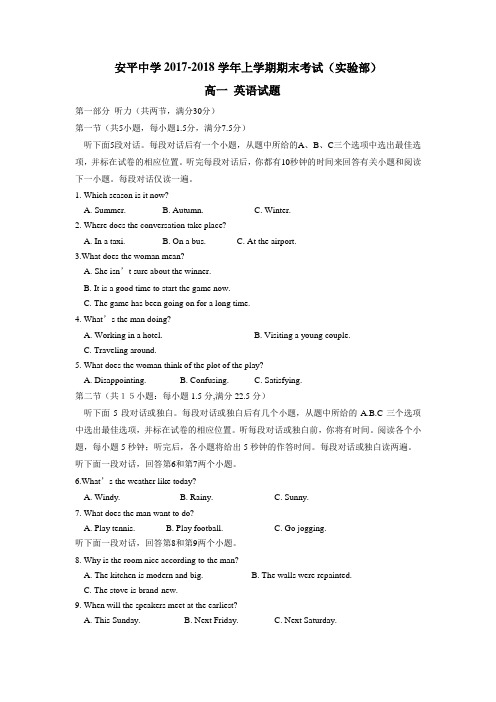
安平中学2017-2018学年上学期期末考试(实验部)高一英语试题第一部分听力(共两节,满分30分)第一节(共5小题,每小题1.5分,满分7.5分)听下面5段对话。
每段对话后有一个小题,从题中所给的A、B、C三个选项中选出最佳选项,并标在试卷的相应位置。
听完每段对话后,你都有10秒钟的时间来回答有关小题和阅读下一小题。
每段对话仅读一遍。
1. Which season is it now?A. Summer.B. Autumn.C. Winter.2. Where does the conversation take place?A. In a taxi.B. On a bus.C. At the airport.3.What does the woman mean?A. She isn’t sure about the winner.B. It is a good time to start the game now.C. The game has been going on for a long time.4. What’s the man doing?A. Working in a hotel.B. Visiting a young couple.C. Traveling around.5. What does the woman think of the plot of the play?A. Disappointing.B. Confusing.C. Satisfying.第二节(共15小题:每小题1.5分,满分22.5分)听下面5段对话或独白。
每段对话或独白后有几个小题,从题中所给的A.B.C三个选项中选出最佳选项,并标在试卷的相应位置。
听每段对话或独白前,你将有时间。
阅读各个小题,每小题5秒钟;听完后,各小题将给出5秒钟的作答时间。
每段对话或独白读两遍。
听下面一段对话,回答第6和第7两个小题。
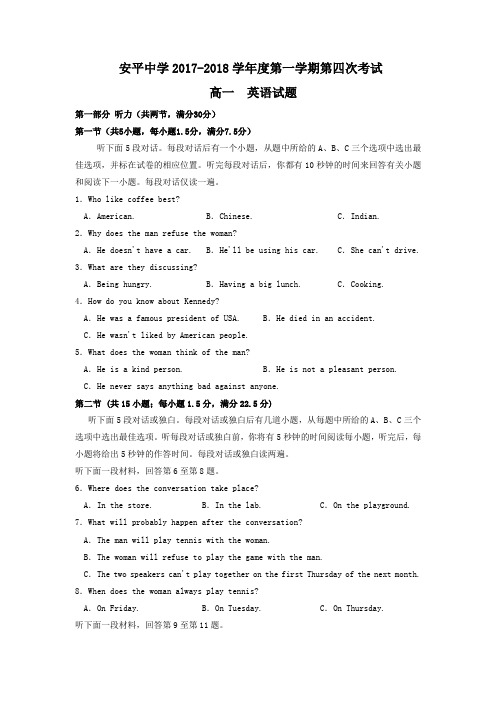
安平中学2017-2018学年度第一学期第四次考试高一英语试题第一部分听力(共两节,满分30分)第一节(共5小题,每小题1.5分,满分7.5分)听下面5段对话。
每段对话后有一个小题,从题中所给的A、B、C三个选项中选出最佳选项,并标在试卷的相应位置。
听完每段对话后,你都有10秒钟的时间来回答有关小题和阅读下一小题。
每段对话仅读一遍。
1.Who like coffee best?A.American. B.Chinese. C.Indian.2.Why does the man refuse the woman?A.He doesn't have a car. B.He'll be using his car. C.She can't drive. 3.What are they discussing?A.Being hungry. B.Having a big lunch. C.Cooking.4.How do you know about Kennedy?A.He was a famous president of USA. B.He died in an accident.C.He wasn't liked by American people.5.What does the woman think of the man?A.He is a kind person. B.He is not a pleasant person. C.He never says anything bad against anyone.第二节 (共15小题;每小题1.5分,满分22.5分)听下面5段对话或独白。
每段对话或独白后有几道小题,从每题中所给的A、B、C三个选项中选出最佳选项。
听每段对话或独白前,你将有5秒钟的时间阅读每小题,听完后,每小题将给出5秒钟的作答时间。
每段对话或独白读两遍。
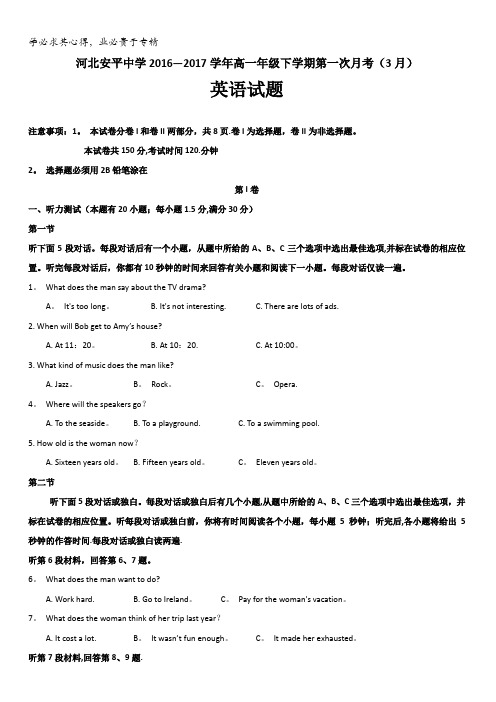
河北安平中学2016—2017学年高一年级下学期第一次月考(3月)英语试题注意事项:1。
本试卷分卷I和卷II两部分,共8页.卷I为选择题,卷II为非选择题。
本试卷共150分,考试时间120.分钟2。
选择题必须用2B铅笔涂在第I卷一、听力测试(本题有20小题;每小题1.5分,满分30分)第一节听下面5段对话。
每段对话后有一个小题,从题中所给的A、B、C三个选项中选出最佳选项,并标在试卷的相应位置。
听完每段对话后,你都有10秒钟的时间来回答有关小题和阅读下一小题。
每段对话仅读一遍。
1。
What does the man say about the TV drama?A。
It's too long。
B. It's not interesting. C. There are lots of ads.2. When will Bob get to Amy’s house?A. At 11:20。
B. At 10:20.C. At 10:00。
3. What kind of music does the man like?A. Jazz。
B。
Rock。
C。
Opera.4。
Where will the speakers go?A. To the seaside。
B. To a playground.C. To a swimming pool.5. How old is the woman now?A. Sixteen years old。
B. Fifteen years old。
C。
Eleven years old。
第二节听下面5段对话或独白。
每段对话或独白后有几个小题,从题中所给的A、B、C三个选项中选出最佳选项,并标在试卷的相应位置。
听每段对话或独白前,你将有时间阅读各个小题,每小题5秒钟;听完后,各小题将给出5秒钟的作答时间.每段对话或独白读两遍.听第6段材料,回答第6、7题。
6。
What does the man want to do?A. Work hard.B. Go to Ireland。
安平中学2017-2018学年第一学期期中考试高一英语试卷本试卷分为第I卷(选择题)和第Ⅱ卷(非选择题)两部分,满分150分。
考试时间为120分钟。
第I卷(满分100分)第一部分听力(共20小题;每小题1.5分,满分30分)第一节请听下面5段对话。
每段对话后有一个小题,从题中所给的A、B、C三个选择项中选择出最佳选项,并标在试卷的相应位置。
听完每段对话后,你都有10秒钟的时间来回答有关小题和阅读下一小题。
每段对话仅读一遍。
1. When is the two speakers’ mom’s birthday?A. On July 10th.B. On July 11th.C. On July 12th.2. What are the two speakers probably talking about?A. A car driver.B. A careless mistake.C. A car accident.3. What will the woman do tomorrow?A. Pick up her mother.B. Go on a picnic.C. Go swimming.4. What did Alice ask the man to do?A. Borrow some books for her.B. Give some books back to her.C. Return some books to the library.5. How does the man probably feel now?A. Concerned.B. Regretful.C. Shocked.第二节请听下面5段对话或独白。
每段对话或独白后有几个小题,从题中所给的A、B、C 三个选项中选出最佳选项,并标在试卷的相应位置。
听每段对话或独白前,你将有时间阅读各个小题,每小题5秒钟;听完后,各小题将给出5秒钟的作答时间。
答卷时应注意事项1、拿到试卷,要认真仔细的先填好自己的考生信息。
2、拿到试卷不要提笔就写,先大致的浏览一遍,有多少大题,每个大题里有几个小题,有什么题型,哪些容易,哪些难,做到心里有底;3、审题,每个题目都要多读几遍,不仅要读大题,还要读小题,不放过每一个字,遇到暂时弄不懂题意的题目,手指点读,多读几遍题目,就能理解题意了;容易混乱的地方也应该多读几遍,比如从小到大,从左到右这样的题;4、每个题目做完了以后,把自己的手从试卷上完全移开,好好的看看有没有被自己的手臂挡住而遗漏的题;试卷第1页和第2页上下衔接的地方一定要注意,仔细看看有没有遗漏的小题;5、中途遇到真的解决不了的难题,注意安排好时间,先把后面会做的做完,再来重新读题,结合平时课堂上所学的知识,解答难题;一定要镇定,不能因此慌了手脚,影响下面的答题;6、卷面要清洁,字迹要清工整,非常重要;7、做完的试卷要检查,这样可以发现刚才可能留下的错误或是可以检查是否有漏题,检查的时候,用手指点读题目,不要管自己的答案,重新分析题意,所有计算题重新计算,判断题重新判断,填空题重新填空,之后把检查的结果与先前做的结果进行对比分析。
亲爱的小朋友,你们好!经过两个月的学习,你们一定有不小的收获吧,用你的自信和智慧,认真答题,相信你一定会闯关成功。
相信你是最棒的!高2025届高一(上)期中考试英语试卷注意事项:1.答题前,考生务必将自己的姓名、准考证号、班级、学校在答题卡上填写清楚。
2.每小题选出答案后,用2B铅笔把答题卡上对应题目的答案标号涂黑,如需改动,用橡皮擦干净后,再选涂其他答案标号。
在试卷上作答无效。
3.考试结束后,请将答题卡交回,试卷自行保存。
满分150分,考试用时120分钟。
第一部分听力(共两节,满分30分)第一节(共5小题;每小题1.5分,满分7.5分)听下面5段对话。
每段对话后有一个小题,从题中所给的A、B、C三个选项中选出最佳选项。
听完每段对话后,你都有10秒钟的时间来回答有关小题和阅读下一小题。
2016—2017学年第二学期高一职教班第二次月考英语试题本试卷共包括三部分,共120分。
其中第一部分和第二部分为选择题,第三部分为非选择题。
第一部分英语知识运用(共分三节,满分40分)第一节语音知识:从A、B、C、D四个选项中找出其划线部分与其他单词划线部分读音不同的选项,并在答题卡上将该项涂黑。
(共5分,每小题1分)()1、A. most B. shop C. cost D. copy( )2、A.dance B.change C.basket D.father( )3、A.idea B.dead C.head D.Ready( )4、A 。
film B. wish C。
child D。
think ( )5、A、smile B.rise C.fine D. hit第二节词汇与语法知识:从A、B、C、D四个选项中选出可以填入空白处的最佳选项,并在答题卡上将该项涂黑。
(共25分,每小题1分)6、I will tell him as soon as he _____ backA。
come B。
comes C。
will come D. came7。
_____ he ____ himself there?No, I don't think so.A。
Do…enjoy B. Does… enjoies C. Does… enjoy s D。
Does…enjoy8、_____ your mother _____ some cleaning on Sundays?A. Does…doesB. Do…does C。
Does…do D. Do… do9、Mr Black often _____ fishing on Sundays, _____ he ?A. goes…doesn’tB. goes…isn'tC. doesn’t go…doD. doesn't go…is10、 He usually _____ TV on Sunday evening。
安平中学2017-2018学年度第一学期第二次考试高一英语试题第一部分听力(共两节,满分30分)第一节(共5小题,每小题1.5分,满分7.5分)听下面5段对话。
每段对话后有一个小题,从题中所给的A、B、C三个选项中选出最佳选项,并标在试卷的相应位置.听完每段对话后,你都有10秒钟的时间来回答有关小题和阅读下一小题。
每段对话仅读一遍。
1。
How will the man go to the park?A。
By bus. B. By bike. C. On foot.2. What will the man do first this evening?A. Go to the cinema.B。
Call on his friends.C。
Go for a walk。
3. What does Betty like collecting?A。
Stamps。
B. Coins. C. Cards.4. Where does the conversation probably take place?A。
In a store。
B. In a hotel. C. In a restaurant.5。
What is the conversation mainly about?A。
A film star。
B. A book。
C. A picture。
第二节(共15小题:每小题1.5分,满分22.5分)听下面5段对话或独白。
每段对话或独白后有几个小题,从题中所给的A.B。
C三个选项中选出最佳选项,并标在试卷的相应位置。
听每段对话或独白前,你将有时间。
阅读各个小题,每小题5秒钟;听完后,各小题将给出5秒钟的作答时间。
每段对话或独白读两遍。
听第6段材料,回答第6、7题。
6。
What’s wrong with the woman?A. She has a headache.B. She has a toothache.C. She has a stomachache. 7。
淮南二中2019届高一年级第一学期教学质量检测英语试题(时间80分钟满分100分)I. 听力(共两节,满分10分)第一节(共5小题;每小题0.5分, 满分2.5分)1. Why do the two speakers want to go to a bar?A. Because they don’t want to be caught in the rain.B. Because they want to have a drink.C. Because they want to meet another friend.2. How long will the man have to wait before the plane takes off at the airport?A. 105 minutes.B. 80 minutes.C. 75 minutes.3. What is the woman going to buy?A. Pants suit.B. A blouse.C. A coat.4. What can we learn from this conversation?A. Michael is playing in the garden.B. Sally is playing in the garden.C. Sally is not present here.5. What kind of coffee does the man prefer?A. White coffee without sugar.B. Coffee with sugar.C. Coffee without milk or sugar. 第二节(共15小题;每小题0.5分,满分7.5分)听第6段材料,回答第6、7题。
6. For which day did the man book a room finally?A. April 22nd.B. April 21st.C. April 23rd.7. How much will the man pay for the room?A. 100 dollars.B. 99 dollars.C. 108 dollars.听第7段材料,回答第8至10题。
8. Why doesn’t the man book the seats downstairs?A. It’s too expensive.B. It’s too crowded.C. It’s too far.9. When does the man plan to see the performance?A. Next Saturday.B. On October 21st.C. On October 25th.10. How much does each upstairs ticket cost?A. $10.B. $3.75.C. $ 2.50.听第8段材料,回答第11至13题。
11. What is the possible relationship between the two speakers?A. Teacher and student.B. Classmates.C. Saleswoman and customer.12. Where does Tom Brown work now?A. In the Spanish department.B. In the Jones at French Company.C. In the National Bank.13. Which language do you think Kathy Smith teaches now?A. German.B. Spanish.C. French.听第9段材料,回答第14至16题。
14. Where does the conversation take place?A. In a bank.B. At an airport ticket office.C. At a police station.15. Where was the woman’s money probably stolen?A. Near the bank.B. On the moving stair from the ground.C. Around the police station.16. What’s the woman doing in the city?A. Doing a business.B. Paying a visit.C. Having lessons.听第10段材料,回答第17至20题。
17. What was children’s education like in the past?A. Children liked to sit in the classroom for hours.B. Children had to go on repeating things until they could learn them by heart.C. Children could think and learn by themselves.18. What do we learn from the passage?A. Children today like staying in school.B. Some children today hate to get out of the classroom when the teachers ask them to.C. Something should be done to encourage children to learn by themselves.19. Why can’t some of the children find jobs?A. They are too young to do so.B. Their parents won’t allow them to do so.C. The teachers won’t help them do so.20. What do many teachers consider?A. Wondering if they can make children learn.B. Wondering if children can learn by themselves.C. Wondering what they should do to help children learn.II. 阅读理解(共10小题;每小题2分,满分20分)阅读下列短文,从每题所给的四个选项(A、B、C、和D)中,选出最佳选项。
ATips for Getting the Most out of a “Photowalk”Photowalks are a great way to get out and get clicking, either by yourself, with a couple of friends, or with a group of people. They can be wonderful for seeing a neighborhood or wild space with new eyes, getting inspired to be more creative with angles and subjects, as well as simply spending time with fun people. Here are a few tips for making sure you get the most out of a photowalk.Pick a spot with lots of interestA photowalk is a perfect excuse to go exploring a new area. However, if you’ve never been to the scene before, you might be disappointed at the final photos. Base your chosen spot on what you feel like photographing—whether that is buildings, people, busy streets, a festival, nature and so on, and make sure the place you’re heading for is filled with what you most want to shoot(拍摄). It will pay off in a satisfying walk if you research your chosen spot beforehand and know what to expect.Invite anyone, no matter what their skill level isYou’ll be surprised at what you learn from people who seem to know nothing about photography. Even with a simple camera, they can catch some outstanding photos. So bring Aunt Betty or your 10-year-old nephew or anyone else whose company you might enjoy on a walk and keep an open mind.Don’t forget themBe sure to take the important small things, such as an extra memory card (or two), an extra fully charged battery, comfortable shoes and clothing. And remember a notepad and pen for taking down notes about places, times, conditions, the names and information of people you meet and any other information you might want to remember about certain shots(照片; 镜头).Keep an eye out for dangerApart from watching the sky for rain, you’ll want to watch out for other people as well. Smartphones are always a target(目标) for thieves but they have become much clearer about the value of digital cameras. Don’t make yourself a target by standing for a very long time holding your camera out in front of you. If you’re in an area that is really busy or you aren’t super comfortable, then just be careful about when to use your camera. Imagine your shot in your head before holding up your camera, or use a camera belt wrapped around your wrist or shoulder.21. To choose a better place for a photowalk, you are supposed to ______.A. spend time discussing with fun peopleB. decide the place on your interestC. choose famous placesD. find a new area22. The people you go photowalking with ______.A. must know the area wellB. have learned photographyC. would like to explore the places for youD. enjoy walking with you and keep an open mind23. You can hold the camera around your wrist or shoulder in case _______.A. it is stolen by a thiefB. it gets wet in the rainC. it loses some informationD. it falls down on the groundBWhen I was a boy, I used to love walking in the woods around my home. My mum warned me several times never to travel so far that I would lose sight of the house. Being a typical boy, however, I soon found myself hiking further and further away, testing just how far I could go into the woods without getting lost. After losing my way once for two hours, though, I decided that I had better leave a trail(痕迹;踪迹) the next time I went for a walk.The very next day I decided to try it. I walked into the woods until the house was out of sight. Then I broke a small branch on a young tree to mark my place. I wandered(徘徊;漫步) further inand broke another limb(大树枝) and then another. In a few spots where there were no limbs small enough, I snapped (折断) the heads off the low plants that were growing where the sunlight broke through the trees. After a while I finally got tired and decided to head back. Turning around I easily found my tracks, but instead of being proud I felt sad. I could see the trail of destruction I had left in the woods going on and on. Looking at the broken limbs and dead flowers I wondered if God was disappointed in me and I vowed(发誓) never to do that again. Instead, I started to cherish my times alone in the woods with nature. I’d sit by the streams and listen to them sing. I’d watch the birds and squirrels. I’d bend down to smell the flowers. An d I even buried an acorn(橡子) or two hoping that one day an Oak might grow.There is an old Native American Saying that goes “We will be known forever by the tracks we leave.” As I have grown older and wiser, I have done my best to never leave a trail of destruction in my life as I did in the woods that day. I have instead tried to leave tracks of love, kindness, goodness, and compassion and I have tried hard to show others that they can do the same. May you always leave tracks of joy as you follow your own trail of love.24. When the boy headed back from the woods, he felt sad because ______.A. he lost his way in the woodsB. he could find his tracks so easilyC. he left many trails of destructionD. God was very disappointed in him25. What does the underlined word “cherish” in Paragraph 2 mean?A. findB. valueC. wasteD. spend26. The author wrote the passage to ______.A. call on us to leave tracks of virtues in lifeB. inform us that we shouldn't destroy treesC. tell us how to avoid getting lost in the woodsD. show us ways to get back home in the forestCImagine you’re at a party full of strangers. You’re nervous. Who are these people? How do you start a conversation? Fortunately, you’ve got a thing that sends out energy at tiny chips(芯片) in everyone’s name tag(标签). The chips send back name, job, hobbies, and the time available for meeting—whatever. Making new friends becomes simple.This hasn’t quite happened in real life. But the world is already ex periencing a revolution using RFID technology.An RFID tag with a tiny chip can be fixed in a product, under your pet’s skin, even under your own skin. Passive RFID tags have no energy source-batteries because they do not need it. The energy comes from the reader, a scanning device(扫描装置), that sends out energy (for example, radio waves) that starts up the tag immediately.Such a tag carries information specific to that object, and the data can be updated. Already, RFID technology is used for recognizing each car or truck on the road and it might appear in your passport. Doctors can put a tiny chip under the skin that will help locate and obtain a patient’s medical records. At a nightclub in Paris or in New York the same chip gets you into the VIP (very important person) section and pays for the bill with the wave of an arm.Take a step back: 10 or 12 years ago, you would have heard about the coming age of computing. One example always seemed to surface: Your refrigerator would know when you needed to buy more milk. The concept was that computer chips could be put everywhere and send information in a smart network that would make ordinary life simpler.RFID tags are a small part of this phenomenon(现象;非凡事物). “The world is going to be a loosely coupled set(松散耦合的一组)of individual small devices, connected wirelessly,” predicts Dr. J. Reich. Human right supporters are nervous about the possibilities of such technology. It goes too far tracking school kids through RFID tags, they say. We imagine a world in which a beer company could find out not only when you bought a beer but also when you drank it. And how many beers. Accompanied by how many biscuits.When Marconi invented radio, he thought it would be used for ship-to-shore communication. Not for pop music. Who knows how RFID and related technologies will be used in the future? Here’s a wild guess: Not for buying milk.27. The article is intended to ______.A. warn people of the possible risks in using RFID technologyB. explain the benefits brought about by RFID technologyC. convince people of the uses of RFID technologyD. predict the applications of RFID technology28. We know from the passage that with the help of RFID tags, people ______.A. will have no trouble getting data about othersB. will have more energy for conversationC. will have more time to make friendsD. won’t feel shy at parties any longer29. Why are some people worried about RFID technology?A. Because children will be tracked by strangers.B. Because market competition will become more fierce.C. Because their private lives will be greatly affected.D. Because customers will be forced to buy more products.30. The last paragraph implies(暗示) that RFID technology ______.A. will not be used for such matters as buying milkB. will be widely used, including for buying milkC. will be limited to communication usesD. will probably be used for pop musicIII. 完形填空(共20小题; 每小题1分,满分20分)阅读下面短文,掌握其大意,从每题所给的四个选项(A、B、C和D)中,选出最佳选项。